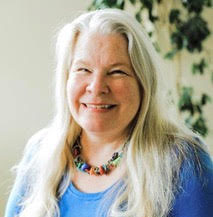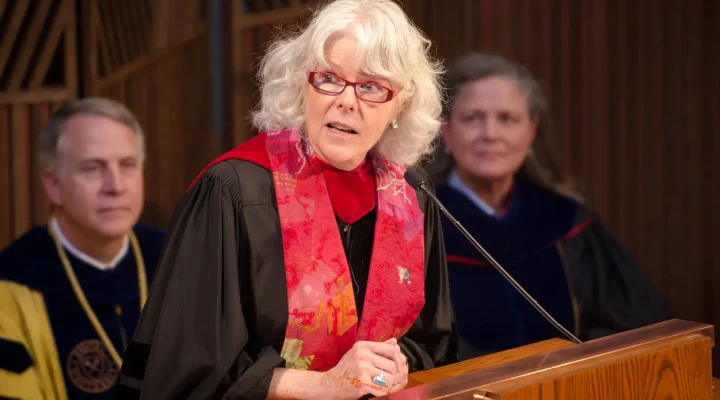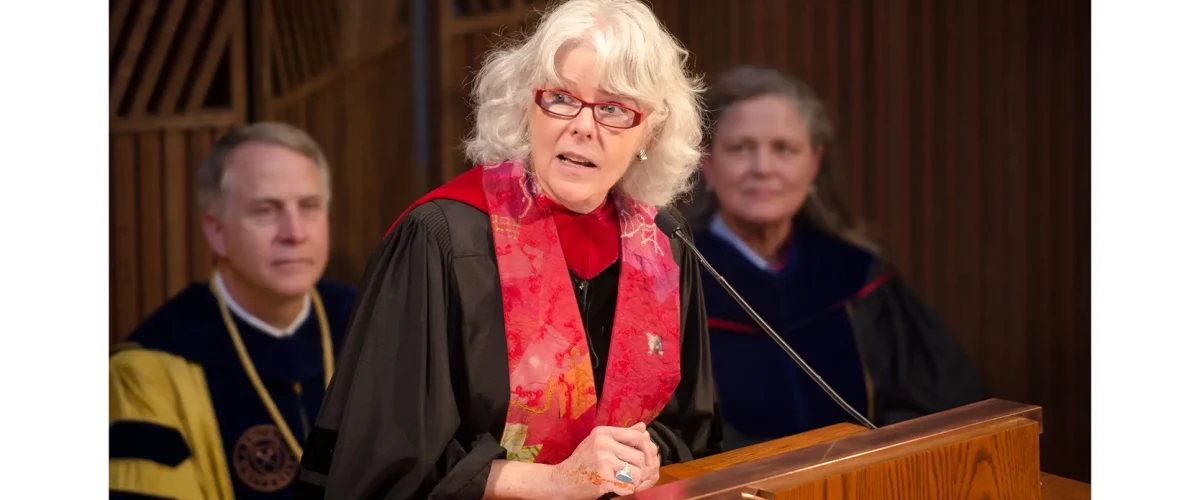When I read Victoria Robb Powers’ story describing the confusion she felt when she encountered a Baptist female senior pastor for the first time, I recalled two similarly disorienting experiences. One incident was completely understandable, in light of my Southern Baptist upbringing; the other was deeply embarrassing and less comprehensible to me. Let’s begin with the embarrassing story, shall we?
Peeping into the sanctuary through the rear doors, I was surprised to see the pews already were almost completely full. I had not anticipated so many people would be present for the pre-conference organ concert. As I made my way up the steps leading to a small balcony where vacant seats remained, I wondered what other surprises were in store for me at the Festival of Homiletics.

Tambi Brown Swiney
I had been dispatched to a church in Atlanta by my pastor to observe this annual preaching conference. The event organizer had reached out to inquire if our church in Nashville would consider being the festival host the following year. Since no one on our church staff was familiar with the event, more information was needed before they were willing to make a firm commitment.
I was absolutely delighted to be asked to serve as my church’s envoy. Since I had been an active layperson in the congregation for more than a decade, the leaders believed I would be a good judge of whether our church had the facilities and resources necessary to host the event.
After taking a seat in the balcony, I surveyed the sanctuary while the music ebbed and flowed. I noted with interest that the pews were filled with men and women in nearly equal measure. “How nice,” I thought to myself, “that so many pastors brought their wives to the festival.” Not until the following morning, when attendees were invited to introduce themselves to one another, did I realize my embarrassing mental lapse. These women were not pastors’ wives. These women were pastors.
Why was I so surprised?
I cringe every single time I recall my deeply flawed perception. If this incident had occurred a few years earlier, perhaps my error could have been more readily excused. But this thought relegating women to the role of wives came two years after I graduated from seminary, five years after I took my first preaching classes. What was I thinking?
If you had stopped me on the sidewalk before I entered that sanctuary in Atlanta and asked if I believed women could preach, I would have responded enthusiastically, “Of course! I heard women preach outstanding sermons while I was in seminary, and I am a woman who has been gifted by God to preach.”
If you had asked me that night if I believed women could be pastors, I would have responded forcefully, “Absolutely! I personally don’t feel called to be a pastor, but I do believe that God equips and calls women for every form of pastoral ministry.”
“I did not understand at the time how deeply ingrained the patriarchal narrative was in my subconscious.”
Throughout the remainder of the festival, as I listened to inspiring preachers like Barbara Brown Taylor, Anna Carter Florence and Roberta Bondi, I continued to ponder my mistake. I was frustrated with myself, disappointed in myself. I did not understand at the time how deeply ingrained the patriarchal narrative was in my subconscious. I had not fully realized how my vocational imagination had been severely stunted by the lack of female pastoral role models throughout my life.
The History of Women in Preaching
Now let’s roll back the calendar six years. As I prepared to register for classes for my second semester in seminary, I was intrigued by the title of one of the preaching courses: “The History of Women in Preaching.” I was confused. I honestly did not know there was a history of women in preaching. Who were these women and where had they been hiding all my life? What had I been missing in the Southern Baptist churches I had attended for 36 years?
On the evening when our small class convened for the first time, I felt simultaneously giddy and terrified. In addition to the assigned readings, each student would be required to write a reflection paper and present a homiletical teaching clinic on an assigned female preacher. Of course, each of us also would be required to deliver a sermon.
“Who were these women and where had they been hiding all my life?”
Through my classmates’ presentations, I learned about Barbara Brown Taylor, Ella Pearson Mitchell, Vashti McKenzie, Elizabeth Achtemeier, Christine Smith, Cheryl J. Sanders and Carol M. Noren — an inspiring history of women in preaching. I was assigned to write and teach about Edwina Hunter. Her story resonated with me, raising questions about my own sense of call and Baptist belonging.
Born in rural Louisiana in the 1930s, Hunter faithfully attended her local Southern Baptist church every Sunday. At the age of 12, she sensed a call to ministry but struggled to imagine what her vocation might look like, since she did not feel drawn to any of the traditional ministry fields accessible to women. Unlike me, she did have a female ministerial role model — a gifted preacher who was pastor of the local Cumberland Presbyterian congregation. Hunter realized at a young age that opportunities to serve as a pastor and to preach would remain out of reach within her own denomination.
When I interviewed Hunter, she recounted the ways God confirmed her calling in the years to come — the people who encouraged her on her journey, the places she was able to identify and use her gifts. I paid close attention when she spoke of the decision she made while in her 40s to leave her lifelong denomination so she could fully live into her calling. Am I going to have to make the same decision one day? I wondered as I typed up my notes from the interview. (Yes, I would.)
I had entered seminary feeling confident God had gifted me to write and to teach. By the end of that semester, I was stunned to realize God also had gifted me to preach. I had a question for God: What are you thinking? This seems like a wasted gift for a Southern Baptist woman.
Troubling experiences
While I would describe my seminary years as very affirming, some of my seminary sisters shared troubling stories with me. I experienced a spaciousness at this interdenominational divinity school after stepping beyond the narrow confines of my denomination. In contrast, they felt as if they had taken a step backward after growing up in more progressive communities of faith.
Two of their stories remain fixed in my mind — accounts of disturbing conversations with men who were guest preachers in chapel services. In one incident, a female student approached a prominent SBC preacher after the service and posed a question: “I have been raised in the Southern Baptist Convention. Will there be a place for me to serve as pastor?” His response: “No. Because women were created last, sinned first and are saved through childbearing.”
After another chapel service, a female student asked that day’s guest preacher — a non-Baptist — what he would say to a woman who felt called to preach. His response: “I would tell her to go back to her prayer closet because she has misunderstood the will of God.”
“If all the Baptist churches that claim to be supporters of women in ministry truly were advocates, then the vocational landscape would look starkly different for women seeking places of service.”
I suspect most BNG readers find these responses to be appalling. You would seek to reassure me that you don’t believe those things and your church certainly does not teach those things. Perhaps you believe that your church decided about women in ministry a long time ago; it’s no longer an issue in your congregation. If all the Baptist churches that claim to be supporters of women in ministry truly were advocates, then the vocational landscape would look starkly different for women seeking places of service.
Obstacles
Women continue to face a gauntlet of obstacles in their quest to use their gifts within Baptist congregations. Some of these barriers are overt, like misogynistic teachings that declare women to be unfit to be pastors, to preach or otherwise exercise authority over men. (Did you read about the movement to bar women from leading worship?) Other roadblocks are more subtle, largely invisible to the broader congregation, often noticed only by those who are directly impacted.
For example, while serving as pastoral intern at my home church during my final year of seminary, I was not invited to preach on a Sunday morning, but the male seminarian who was an intern the next year was afforded that opportunity. When a new youth minster was hired by that congregation, he challenged the very idea that God could call a woman to preach in our first conversation.
Congregations that joyfully affirm the daughters of the church who come forward to express a call to ministry are often the same churches that will not consider hiring a woman to be their own pastor, the same places that will not invite a woman to preach.
“We need someone with more experience,” a member of the search committee will explain. “Sunday mornings are too important to allow an inexperienced young woman to preach,” the pastor will insist. But how will women gain the prerequisite experience if opportunities to serve and learn and grow remain elusive?
“How will women gain the prerequisite experience if opportunities to serve and learn and grow remain elusive?”
During Baptist Women in Ministry Month of Advocacy, these words from Edwina Hunter’s ordination service remain timely: “Thank God for a stable, a church, a denomination that invites us in and provides a place where we can bring all that we are and give birth to that which the Spirit of God has conceived within us.”
Which denominations and churches are currently serving as stables where women can give birth to that which God has conceived within them? If you read the State of Women in Baptist Life Report 2021, then you recognize that although some progress has been made, much more work remains to be done. When I read the report as I prepared to move from my home state of Tennessee to North Carolina last year, I commented to a friend that I was heading to the promised land: I was leaving a state that had only five female pastors/co-pastors in 2021 to put down roots in a state with 70 female pastors/co-pastors — the highest number of any state.
What was I thinking that night in Atlanta when I falsely assumed the women at the Festival of Homiletics were pastors’ wives? I was thinking what I had been conditioned to believe after years of exclusively hearing male voices preach, after decades of only hearing men referred to as pastors. Despite my seminary training, despite my recognition of my gifts, despite my budding sense of calling, that night I suffered from a failure of vocational imagination.
During BWIM Month of Advocacy, what will you and your church do to nurture the vocational imagination of her daughters? What are the next steps you and your church can take in affirming, valuing and elevating women in ministry?
Tambi Brown Swiney is an ordained Baptist minister and writer who lives in the mountains of Western North Carolina. She has pastoral experience serving in both congregational and community contexts. She has served on the leadership team for Baptist Women in Ministry and on the BJC board of directors. She is currently a student in the Haden Institute’s spiritual direction training program.
Related articles:
Think you’ve ‘decided’ about women in ministry? Here’s why there’s more to do | Opinion by Meredith Stone
Scripture changed his mind on women in ministry, Rick Warren tells Russell Moore
This isn’t about me | Opinion by Victoria Robb Powers


